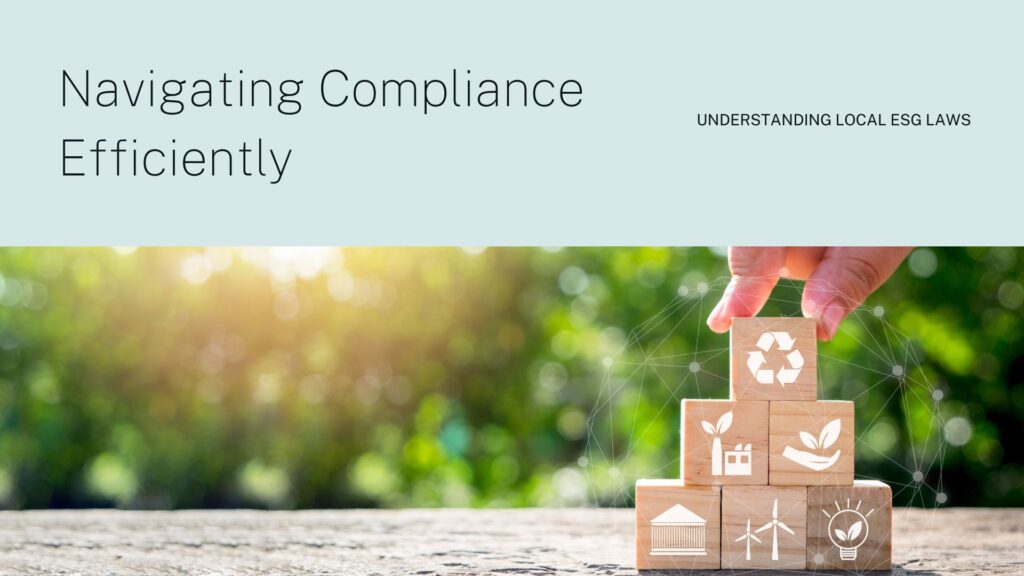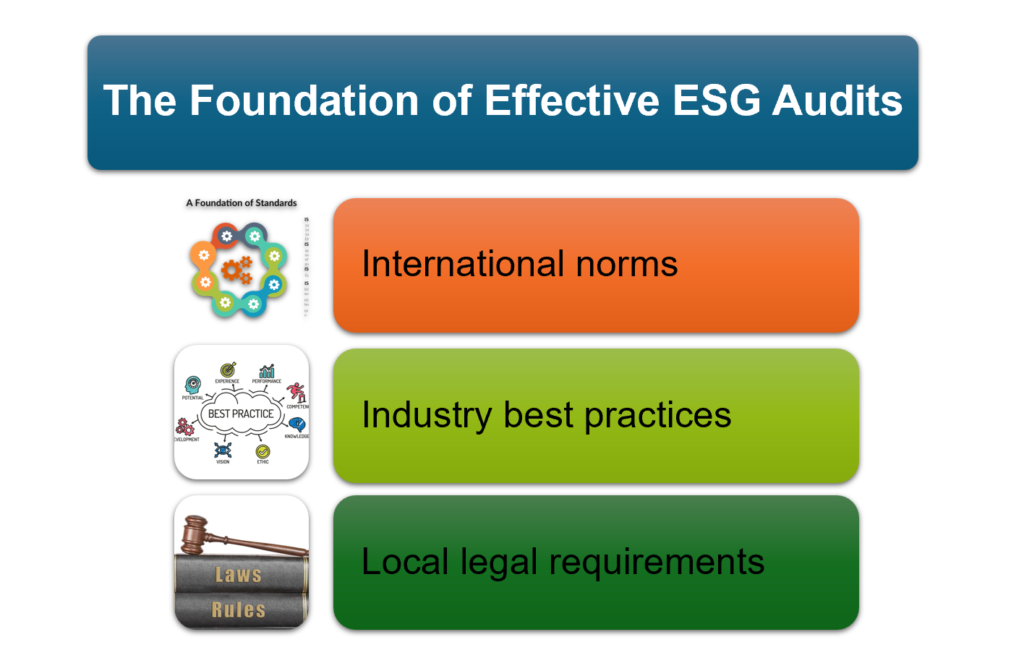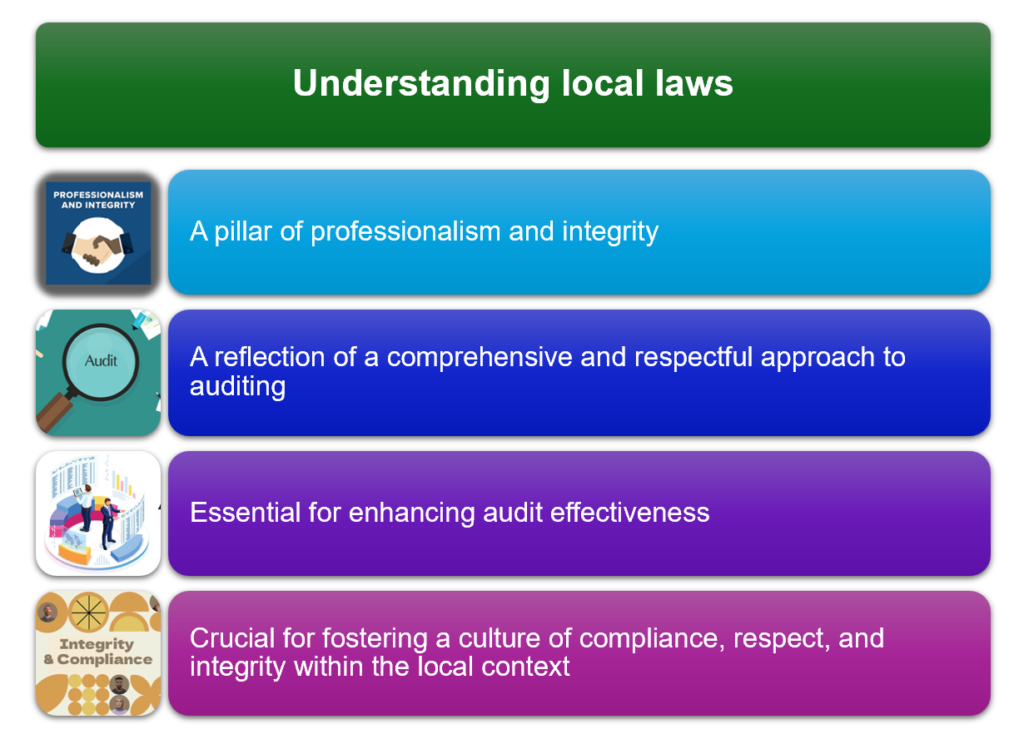
In the intricate ballet of ESG audits, particularly those focused on social compliance and human rights, the understanding of local laws and regulations plays a critical role. As auditors venture into diverse territories, each with its own legal landscape, a thorough grasp of these laws becomes not just beneficial but essential. This knowledge ensures that ESG audits are not only comprehensive but also relevant and respectful of the jurisdictional nuances that define ethical business practices worldwide.
The Foundation of Effective ESG Audits
Effective ESG audits rest on the auditor’s ability to assess an organization’s adherence to a wide array of standards, including international norms, industry best practices, and, crucially, local legal requirements. The intersection of these elements forms the basis for a thorough evaluation of an organization’s practices. However, it is the understanding of local laws that often proves to be the linchpin in identifying non-compliance and advising on corrective measures.

Venturing into New Territories: The Homework Begins
For auditors exploring new territories, the preparation phase of an audit is significantly amplified. Beyond familiarizing themselves with the organization’s policies and the broader industry standards, auditors must embark on a meticulous study of the local legal framework. This includes, but is not limited to, labor laws, environmental regulations, health and safety standards, and any specific legislation pertaining to human rights and ethical business conduct.
This preparatory work does more than just ensure the auditor’s readiness; it lays the groundwork for an audit that is attuned to the specific challenges and obligations of operating in that locale. Moreover, this understanding fosters a respectful dialogue between the auditor and the organization, demonstrating a recognition of the local context in which the business operates.
The Ever-evolving Legal Landscapes
Even in familiar territories, where auditors might feel confident in their grasp of local laws, the legal landscape is seldom static. Laws evolve, new regulations emerge, and existing ones are amended or repealed. Therefore, an essential part of an auditor’s preparation involves checking for updates and changes in relevant local laws and regulations before each audit.
This continuous learning process is not merely a procedural step; it is a reflection of the auditor’s commitment to conducting a genuinely relevant and up-to-date assessment. It acknowledges the dynamic nature of legal and regulatory frameworks and ensures that the audit’s findings and recommendations are grounded in the current legal context.
Bridging Compliance and Local Legal Requirements
The essence of understanding local laws extends beyond mere compliance; it is about bridging the gap between international standards and local legal requirements. This bridge forms the basis for recommendations that are not only compliant with global norms but also feasible and effective within the local legal framework.
For instance, while international labor standards may set broad principles around workers’ rights, local labor laws provide the specific legal obligations and rights applicable within a country or region. An auditor’s nuanced understanding of these laws enables them to identify compliance gaps more accurately and recommend practical, legally sound corrective actions.
Case in Point: The Real-world Impact
Consider a ESG audits in a manufacturing facility in Southeast Asia. An auditor, well-versed in both international labor standards and local labor laws, identifies discrepancies in overtime practices. While the facility may be adhering to a generic interpretation of acceptable working hours, a deep dive into the local labor law reveals non-compliance with specific statutory limits on overtime and mandated rest periods. Armed with this knowledge, the auditor can pinpoint the non-compliance issue, making it clear that adjustments are not just about aligning with international norms but fulfilling local legal obligations.
Conclusion: A Pillar of Professionalism and Integrity

Understanding local laws is more than a technical requirement for compliance auditors; it is a pillar of professionalism and integrity. It reflects a comprehensive and respectful approach to auditing, recognizing the sovereignty of local legal systems and the importance of contextualized compliance. As auditors navigate the complex terrain of social compliance and human rights auditing, their prowess in local legal frameworks not only enhances the audit’s effectiveness but also underscores their role as informed, respectful, and effective agents of change.
In the dynamic field of compliance auditing, continuous education and adaptation to local legal nuances highlight the auditor’s role as not just evaluators but as facilitators of ethical business practices. By prioritizing the understanding of local laws, ESG auditors ensure that their assessments are not just about meeting global standards but about fostering a culture of compliance, respect, and integrity that resonates within the local legal and cultural context.
